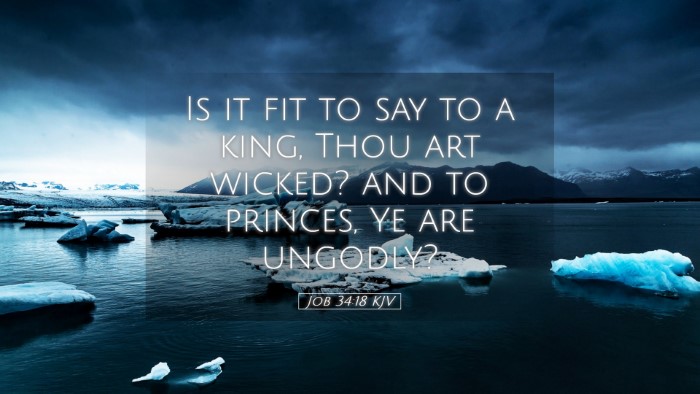Commentary on Job 34:18
Verse: "Is it fit to say to a king, Thou art wicked? and to princes, Ye are ungodly?" (Job 34:18)
Introduction
The book of Job encapsulates profound themes of suffering, divine justice, and the human condition. In Job 34:18, Elihu speaks concerning the nature of God's justice and the inappropriateness of accusing Him of wrong. This commentary aims to explore the implications of this verse through insights gathered from notable public domain commentaries, specifically those by Matthew Henry, Albert Barnes, and Adam Clarke. We aim to provide a rich theological tapestry that addresses the needs of pastors, scholars, and students.
Contextual Analysis
Job's discourse naturally raises questions about divine justice amidst human suffering. Elihu, one of Job's friends, offers a unique perspective that aims to elevate the understanding of God's character above mere human assumptions.
1. The Role of Elihu
Elihu distinguishes himself from Job's other friends by emphasizing the majesty and righteousness of God. While the others focused on Job’s supposed sins, Elihu makes an appeal to God’s nature rather than human morality alone. He asserts that it is inappropriate to accuse God or representatives of divine authority of wickedness.
2. The Question of Divine Authority
When Elihu asks if it is "fit to say to a king, Thou art wicked?" he highlights the gravity of questioning the integrity of authority figures. This raises critical reflections on how humanity approaches God’s authority. Elihu's rhetorical question urges readers to consider God's righteousness and justice and to refrain from making accusations against Him.
Theological Insights
In this verse, several theological themes can be discerned, which have implications for understanding God's character and human responses to His authority:
- The Sovereignty of God: Elihu's remarks reflect a foundational Christian belief in God's sovereignty. As Matthew Henry notes, God's authority is unequivocal, and His judgments are always just.
- The Holiness of God: Albert Barnes emphasizes that God's inherent righteousness prohibits unjust behavior, suggesting that no accusation can rightly stand against Him.
- Human Limitations: Adam Clarke reiterates that humans cannot comprehend the divine workings; thus, questioning God's justice is both presumptuous and foolish.
Commentary Insights
Matthew Henry's Perspective
Matthew Henry elaborates on the idea that just as it would be improper to address an earthly king as wicked, it is infinitely more inappropriate to declare the Creator unjust. Human beings, in their finiteness, should recognize the limitations of their understanding when interpreting divine actions. Henry underscores the need for humility before God's vast wisdom.
Albert Barnes' Analysis
Albert Barnes stresses that God’s ways and judgments surpass human understanding. He argues that Elihu’s question serves as a reminder that one cannot rightfully charge God with injustice, especially given the supremacy of divine authority over all earthly powers. Barnes notes that such a mindset brings about a profound misunderstanding of God’s nature.
Adam Clarke's Commentary
Adam Clarke addresses the moral implications of Elihu's assertions by emphasizing the danger of ill-conceived accusations against God. Clarke argues that such claims reflect ignorance of divine wisdom and justice. He proposes that acknowledging God’s righteous authority is crucial for an honest theological reflection.
Practical Application
This verse carries significant implications for modern believers. Here are some reflections on how it can be applied in pastoral care, teaching, and personal devotion:
- Reverence for God: Understanding God’s sovereign authority fosters a spirit of reverence that can lead to deeper worship and commitment.
- Encouragement in Suffering: In times of suffering, believers are reminded to trust in God's goodness and justice, rather than defaulting to doubt and anger toward Him.
- Effective Ministry: Pastors and teachers can utilize this verse to encourage congregations to maintain a proper understanding of God's character, reinforcing His reliability and integrity during life's hardest moments.
Conclusion
Job 34:18 serves as a powerful reminder of the integrity of God’s sovereignty and righteousness. Through the insights of Elihu, and the analyses of Matthew Henry, Albert Barnes, and Adam Clarke, we recognize the importance of maintaining a posture of humility and reverence—both before God and in our theological discussions. With the acknowledgment of God’s authority, believers are drawn into a deeper, more transformed relationship with their Creator.
As we reflect upon this verse, may we strive for a greater appreciation of God’s character, ensuring that in all our discussions about justice, suffering, and divine authority, we uphold the truth of God’s perfect righteousness and holiness.


